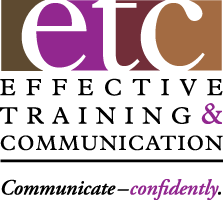The words you use in routine workplace writing, interactions and presentations do make a difference. They can impact your results, professionalism and image as a receiver-centric communicator. Or, your words can detract from those results. So, choose your words wisely!
To help you on this journey, enjoy this summary of 12 Best Practices or ‘Recurring Themes’ I typically share in my training or coaching engagements. I don’t ask participants to change any of their word use or style habits. But, I often ask them to challenge those habits themselves in light of what we discuss. If they decide to change any of them, that’s fine. If not, that’s fine, too.
So, let’s focus on the word use tools in your Workplace Communicator Tool Kit. Some of you may find some new tools to add to it. Most of you will find new, different or better ways to use the tools you already have. Either way, you win. So do the people who read or hear your words.
1. Everything you write or say at work should be on purpose and for a purpose.
2. Similarly, everything you write or say positions you and projects an image of professionalism, courtesy and credibility … or detracts from it
3. The process of creating effective workplace messages is essentially the same. The variable is the medium you choose to transmit those messages.
4. Strive for Reader/Listener-Centricity. Write or speak for them, not you. Write or speak for them the way they want you to, not the way you want them to write or speak for you.
5. Err on the side of over-communicating important messages to increase your probability of success.
6. Strive for simplicity and brevity, but never at the expense of clarity.
7. Go beyond the ‘first word you can think of’ or the ‘word you usually think of’ all the way to the ‘best word you can think of’ to accomplish your intended outcome with your reader or audience.
8. Even if you’re simply informing your readers or listeners – ‘telling’, you’re still persuading them – ‘selling’. You’re selling the value of the information you’re sharing and your credibility.
9. Whenever you can, choose precise and consistent words, verbs over nouns, active voice over passive voice and second person over third person.
10. Conforming to logical, relevant and important grammatical rules should increase the consistency, clarity and professionalism in your workplace communications.
11. With all emails, include something in the subject line to help your readers quickly assess and deal with them.
12. No one should see or hear you first draft of important messages. Everyone will see or hear your final draft.
You may have heard these Recurring Themes before if you’re a regular reader of ‘Communicate Confidently’ or a frequent visitor to ETC’s site. You’ve also heard them if I’ve ever had the pleasure of working with you.
But even if this is the first time you’ve encountered these Best Practices, you should see enough value to put them in your expanding Tool Kits and start using them with every interaction every day. That’s how you’ll become All Star Workplace Communicators … because the words you use do make a big difference and you must choose wisely!
